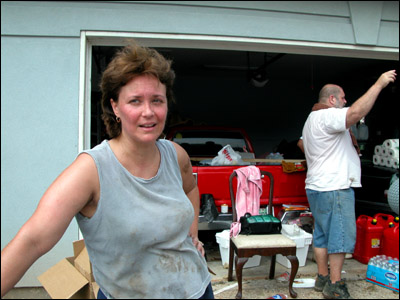 |
 | ||
|
Julie Suaste part 1, 2 Julie and her husband, Ruben, were both dealers at Biloxi's swankiest casino, the Beau Rivage. Two days before Katrina hit the Gulf Coast, they scooped up their one-year-old son, Nico, got the dog in the car, and evacuated to Florida. When they got back two days after the storm, they found that a house from the end of their cul-de-sac had washed up on their front yard. "It was basically a tsunami," says Ernie Lehman, a friend helping Julie clean up. "It wasn't a situation where the water just rose. It came in and demolished everything in its path. It's incredible"
Six days after the storm, the Suastes' new, one-story home is still standing. But shoulder-high flood waters have wiped out nearly everything inside. Julie is sorting through the wreckage with family members who drove down from Indiana to help. She wears white rubber boots, blue shorts and a tank top. Blotches of mud tattoo her arms. Family photos are spread out in the sun to dry. Julie wonders if the sopping videotape of her son's first bath will ever play again. "I step back and tell myself it's just a really bad dream," she says. "It's numbing. Absolutely numbing." It was already a year of pain and loss before Katrina struck. Julie's father had died in March. Her grandfather in April. Her grandmother in May. "It's been a year I want to forget," she says. But more unhappy memories are to come. The Suastes' house wasn't in a flood zone so they don't have flood insurance. "Those of us above sea level were not required to have flood insurance," Julie explains. Her insurance company told her it would be a waste of money. But Julie's homeowner's policy will only cover wind and rain damage. Within weeks of Katrina, Julie's insurance company breaks the distressing news: It will pay her a total of $3,400 for damage to the roof, garage door and windows. The house had been worth about $175,000. "If you don't have flood insurance it's pretty much too bad," she says in exasperation. "What's $3,400 supposed to do? I can't even fix my roof for that. I can't get my family a place to stay for that." More than 30,000 Gulf Coast homeowners were facing a similar problem. People who live outside an official flood zone are generally not required by their mortgage companies to buy special flood coverage. But they can still buy flood insurance if they want, according to Bill Bailey of the Insurance Information Institute, an insurance industry group. "If you live 4 feet from the top of Mount Everest you can get flood insurance," he says. No insurance companies offer their own flood insurance, Bailey says. It's too risky. Instead, insurance agents sell policies from the National Flood Insurance Program. In the year since Katrina, the federal program paid out $2.3 billion. But none of that, of course, went to homeowners without flood coverage. Many of them were caught by surprise when they realized they weren't covered. Thousands of them, though not the Suastes, would later sue their insurance companies. A year after Katrina, the cases would still be in court. Bailey says he sympathizes with homeowners who thought their conventional coverage would pay for flooding. But then he picks up the exclusions page of a typical policy and reads aloud what kind of damage the policy does not cover. "Flood, surface water, waves, tidal water, overflow, spray, whether or not driven by wind." By Halloween, six weeks after Katrina, Julie and Ruben are living on a cruise ship. It's a Carnival Line vessel docked at Mobile, Alabama that FEMA is using as a shelter for hurricane victims. Julie has sent her son to live with his aunt and grandmother in Indiana. She and Ruben have temporary jobs working seven days a week, 12 hours a day processing flood insurance claims from policyholders in New Orleans. One of their tasks is to talk with storm victims on the phone. It's like hearing themselves on the other end of the line. "They get upset, they start crying," she says. "They're like, 'You don't understand, I lost everything.'" Julie refrains from telling them that she, too, lost everything to Katrina's flood waters. "I do know how they feel and I want to get their claims processed as quickly as possible. My personal situation is exactly the same if not worse. We don't have any flood insurance to even wait for the check."
Continue to part 2 |
||
 Julie takes a break as friends help dry and pack property for storage.
Julie takes a break as friends help dry and pack property for storage.